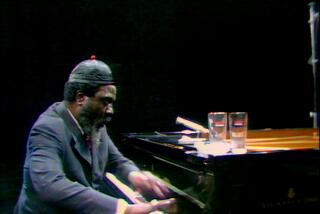BENNY GOODMAN AND THE SWING ERA <i> by James Lincoln Collier (Oxford University Press: $22.95; 404 pp.) </i>
- Share via
James Lincoln Collier likes to paint ‘em dark: In earlier books, he portrayed Louis Armstrong and Duke Ellington in less than flattering terms, to the distress of their friends and admirers. Clarinetist Benny Goodman was more widely acknowledged as a prickly fellow, so Collier would seem to be on steadier ground for this round.
As usual, however, he indulges in slapdash, at times parodistic psychoanalysis: “Benny does not seem to have been very close to his mother.” Collier’s revisionist bent is his strength as well as his weakness. At his best, he picks apart the oft-cited myths surrounding Goodman’s swing band. The band hit the big time in a Los Angeles ballroom in 1935 at the end of a disastrous cross-country tour. Legend has it the band succeeded in Los Angeles because Goodman’s live coast-to-coast broadcasts from New York were aired in prime time in California but ran too late in the rest of the country to cultivate a broad audience for his new dance music. Collier discloses that the tour was not an unmitigated flop and that Goodman’s broadcast schedule actually gave the whole country access to his music at a decent hour.
The author sensibly underscores the connections between the playing of the swing king from Chicago’s Jewish ghetto and urban Jewish klezmer music with its keening clarinets. But Collier’s lengthy analyses of particular recordings are pedestrian. (Gunther Schuller covered them better in his recent “The Swing Era.”) Finally, the author fails to paint a vivid picture of the elusive Goodman himself.
In a long digression on the origins of big-band orchestration, Collier asserts that swing’s true patriarchs are not the great black arrangers Don Redman and Fletcher Henderson but rather Ferde Grofe (best known as the composer of “The Grand Canyon Suite”) and his employer, bandleader Art Hickman.
Of course, whites have played key roles in the development of jazz almost since the beginning, but the cumulative effect of Collier’s idee fixe has a regrettable racist tinge. Indeed, such overenthusiasm caused the commercial-minded Goodman (rather than the more worthy Duke Ellington or Count Basie) to be hailed as the King of Swing in the first place.
More to Read
Sign up for our Book Club newsletter
Get the latest news, events and more from the Los Angeles Times Book Club, and help us get L.A. reading and talking.
You may occasionally receive promotional content from the Los Angeles Times.










